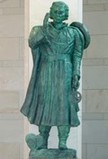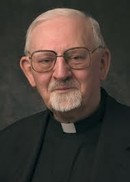Terms: A | B | C | D | E | F | G | H | I | J | K | L | M | N | O | P | Q | R | S | T | U | V | W | X | Y | Z
Jesuit Terms K
Kingdom, The (or Reign of God)
Jesus preached that God's Reign (or Kingdom or Dominion) was breaking into the world in his time. That reign was not a secular political rule but a blessed condition of God's presence creating healing, justice, love, and peace.
As an introduction to the second week of the Spiritual Exercises (the period of contemplating Jesus' life), Ignatius presents the figure of an ideal human ruler and asks whether you would follow him (her) no matter how great the cost. Then, he reasons, how much more would you want to follow Christ the King in working to bring about God's Kingdom or Reign. Thus, in the context of the "faith that does justice," the Kingdom becomes a "future construct" against which to recognize, critique, and work to overturn the evils in this world, especially the unjust structures that dominate the poor.
Kino, Eusebio (1644-1711) [in German, Eusebio Kühn]
Italian/German Jesuit; missioner; explorer
 Born near Trent in the Italian Alps, Eusebio Kino entered the Jesuits in the Upper [that is, southern] German Province. In addition to the usual Jesuit studies in the humanities, philosophy, and theology, he also studied geography and cartography. In 1681, he went to the Mexican Province mission in Sonora, lower Arizona, and California and served there for the rest of his life. He started with the already established Jesuit missions along the Sierra Madre and spread out from there both east and west, often mapping the territory as he went along; he seemed to live in the saddle. With the native people he started cattle ranches and introduced European cereals and fruits to their farms. Also a diarist, he chronicled the growth of the church on this frontier.
Born near Trent in the Italian Alps, Eusebio Kino entered the Jesuits in the Upper [that is, southern] German Province. In addition to the usual Jesuit studies in the humanities, philosophy, and theology, he also studied geography and cartography. In 1681, he went to the Mexican Province mission in Sonora, lower Arizona, and California and served there for the rest of his life. He started with the already established Jesuit missions along the Sierra Madre and spread out from there both east and west, often mapping the territory as he went along; he seemed to live in the saddle. With the native people he started cattle ranches and introduced European cereals and fruits to their farms. Also a diarist, he chronicled the growth of the church on this frontier.
In 1965 the state of Arizona dedicated a statue of Kino in Statuary Hall in the U.S. Capitol.
Kolvenbach, Peter-Hans (1928-2016)
Dutch-born superior general of the Society of Jesus from 1983, when the Jesuits were allowed to return to their own governance after a time of papal "intervention," until 2008, when he resigned at the age of 80.
He entered the Jesuits in 1948, went to Lebanon in the mid-1950s, earned a doctorate from the famous Saint Joseph's University in Beirut, and spent much of his life there, first as a professor of linguistics and then as superior of the Jesuit vice-province of the Middle East.
By his own admission, he was relatively "ignorant of matters pertaining to justice and injustice," when he went from Beirut to Rome for Jesuit General Congregation 32 and witnessed the faith-justice emphasis emerge from the congregation under the leadership of Pedro Arrupe [see "The Service of Faith and the Promotion of Justice"]. Still, as superior general, he worked tirelessly in collaboration with his advisors to implement and extend the direction in which his predecessor had been leading the Society. See "Men and Women for Others".
He leaves a legacy to Jesuit higher education in a series of major addresses, most notably at Georgetown University (Assembly '89) and at Santa Clara University (2000). See "Men and Women for Others"
Addresses of Peter-Hans Kolvenbach, S.J. delivered at American universities
-
The Service of Faith in a Religiously Pluralistic World (Xavier University, 2006), reprinted in A Jesuit Education Reader (2008).
Cooperating with Each other in Mission (Creighton University, 2004)
A Focus on Solidarity (Spring Hill College, 2004)
The Service of Faith and the Promotion of Justice in Jesuit Higher Education (Santa Clara, 2000) reprinted in A Jesuit Education Reader (2008). A precis of the text can be found in Do You Speak Ignatian? and here in the "Jesuit A-Z" under "Men and Women for Others/Whole Persons of Solidarity for the Real World."
Address at Assembly 1989: Jesuit Ministry in Higher Education (Boston College)
Themes of Jesuit Higher Ed. (Creighton University, 2000)

